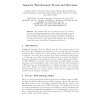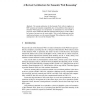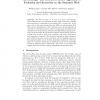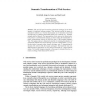108
Voted
PREMI
2005
Springer
15 years 8 months ago
2005
Springer
The Semantic Web is not a single technology, but rather a collection of technologies designed to work together. As a result, research on the Semantic Web intends both to advance in...
131
Voted
PPSWR
2005
Springer
15 years 8 months ago
2005
Springer
The current architecture for the Semantic Web, with its emphasis on RDF syntactic and semantic compatability, has severe problems when expressive Semantic Web languages are incorpo...
135
Voted
PPSWR
2005
Springer
15 years 8 months ago
2005
Springer
Abstract. We discuss language architecture for the Semantic Web, and in particular different proposals for extending this architecture with a rules component. We argue that an arch...
112
Voted
PPSWR
2005
Springer
15 years 8 months ago
2005
Springer
This articles discusses the logic, or logic-based, languages required for a full deployment of the Semantic Web. It presents ten theses addressing
130
Voted
PPSWR
2005
Springer
15 years 8 months ago
2005
Springer
The Semantic Web is an endeavour aiming at enhancing Web data with meta-data and data processing, as well as processing methods specifying the “meaning” of such data and allowi...
129
Voted
PPSWR
2005
Springer
15 years 8 months ago
2005
Springer
Abstract. In this paper we define the basic concepts for a general language for evolution and reactivity in the Semantic Web. We do this by exposing an UML model that specifies a...
115
Voted
OTM
2005
Springer
15 years 8 months ago
2005
Springer
Abstract. The Web of today can be seen as an active and heterogeneous infrastructure of autonomous systems, where reactivity, evolution and propagation of information and changes p...
129
Voted
OTM
2005
Springer
15 years 8 months ago
2005
Springer
Ontologies play a key role in Semantic Web research. A common use of ontologies in Semantic Web is to enrich the current Web resources with some well-defined meaning to enhance th...
91
Voted
OTM
2005
Springer
15 years 8 months ago
2005
Springer
Abstract. Web services have become the predominant paradigm for the development of distributed software systems. Web services provide the means to modularize software in a way that...
143
Voted
ICWE
2005
Springer
15 years 8 months ago
2005
Springer
Web Engineering is going through several major changes. New promising application fields related to the Web such as the Semantic Web and Web Services, and its combination, Semantic...




